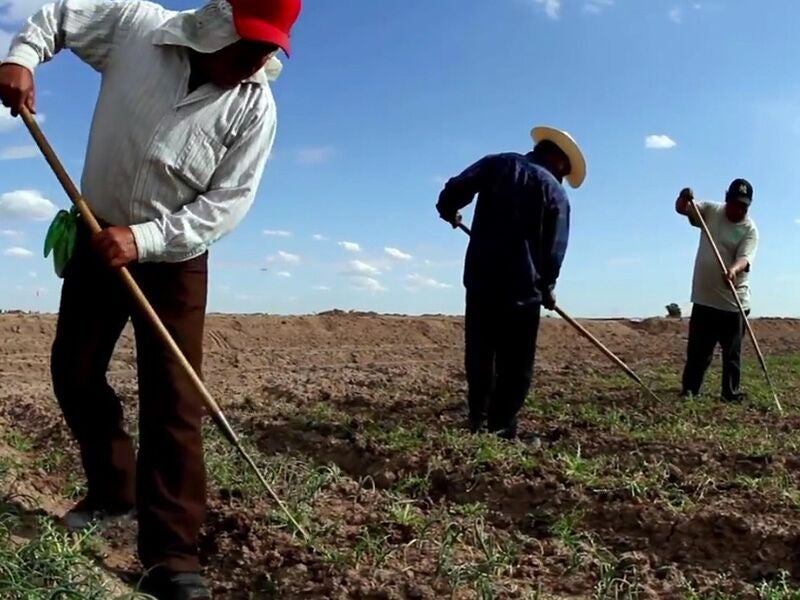This Thanksgiving, Remember that Hands Grow Your Food
The people who grow our food deserve the same health protections that you and I enjoy. This Thanksgiving, you can take action to help them.

This page was published 6 years ago. Find the latest on Earthjustice’s work.
One morning many years ago, my best friend and I put cameras and microphones in the back of my jeep and drove to the nearest farm field. Our mission was simple yet daunting: document farm work, officially become filmmakers and show our movie in theaters as soon as possible.
We were young and we were dead broke, but we were serious. We wanted to make visible the agricultural field and the people behind the food we eat.
It’s been 10 years since our video project took us into the middle of a broccoli field, yet I still remember with awe the tractor armed with conveyor belts and the dozens of farmworkers behind it. The men and women, all Latinos, worked in unison in a smooth assembly line. It was beautiful. While some swiftly cut the bonsai-looking plants, others tied stalks with a machine, and then off the broccoli went into a box after a quick wash. These farmworkers choreographically bent, cut, picked and packed over and over and again. It was grueling labor, but none hesitated in their movements, and frankly, I don’t remember any of them taking a break.
In March we celebrated the 20th annual National Farmworker Awareness Week, which is a time when the country honors the 2.5 million farmworkers who are working the fields from sunrise to sunset. That week is about raising awareness of farmworker conditions, and how farmworkers provide so much for our country. But a week is not enough to honor farmworkers, which is why this Thanksgiving we may want to consider being thankful not just for our families, our health, our work, or our food, but for the hands that grow our food.
Indeed farmworkers’ contributions are remarkable. More than 85 percent of the fruits and vegetables we eat are handpicked by men, women and children, mostly Latinos, whose work is as underappreciated as it is dangerous. Indeed, the hands and bodies that grow our food face risks day in and day out, to the point that, according to the Centers for Disease Control and Prevention, agriculture ranks among the most hazardous industries.
Farmworkers are constantly exposed to potential transportation incidents, like tractor overturns. But farmworkers also face a stealthier danger—pesticides. Every year, doctors diagnose up to 20,000 poisonings among agricultural workers—enough people to populate the average rural American town. And that’s only what’s reported.
> 3.89
2.94–3.88
2.46–2.93
1.86–2.45
< 1.85
Research shows that pesticide exposure poses serious short- and long-term health risks to children and adults. The immediate results of acute pesticide poisoning can include rashes, vomiting and death. In the long-term, pesticide exposure has been associated with increased risk of cancer, infertility, neurological disorders and respiratory conditions. Pesticides also pollute the air and water, a burden disproportionately borne by rural communities and farmworker families.
Though the dangers are clear and ongoing health impacts to farmworkers are widely documented, one of the first things Trump’s EPA did was delay key pesticide safeguards that Big Agriculture said were too costly. It also refused to ban chlorpyrifos, a pesticide linked to intellectual disabilities in children and countless farmworker poisonings.
Earthjustice, along with its clients and partners, successfully worked with lawmakers to protect many of these pesticide safeguards through legislation this year. However, a rule that prevents pesticide applicators from spraying people with these poisons is still on the chopping block, so we are working to defend it. We are also still fighting in court to ban chlorpyrifos and we are confident we will succeed.
But attacks are likely to continue under the Trump administration’s reckless agenda with the help of EPA Administrator Andrew Wheeler, who is keen on gutting health safeguards that took years to be approved in the first place. We can’t let this happen.
The people who grow our food deserve the same health protections that you and I enjoy—period. Because being poisoned by pesticides is not part of their job description, or anyone’s job description for that matter. This Thanksgiving is a good time to think hard on that simple fact. But more significantly, it is a good time to take action.
Earthjustice, among other groups, has worked through the courts and through state-based advocacy for years to ban the toxic pesticide chlorpyrifos. In August, we were back in court, asking for an order directing the EPA to put a full ban in place. Join us in urging the government to keep chlorpyrifos out of our food, our water, our schools and yards, and our bodies.
Established in 1989, Earthjustice's Policy & Legislation team works with champions in Congress to craft legislation that supports and extends our legal gains.